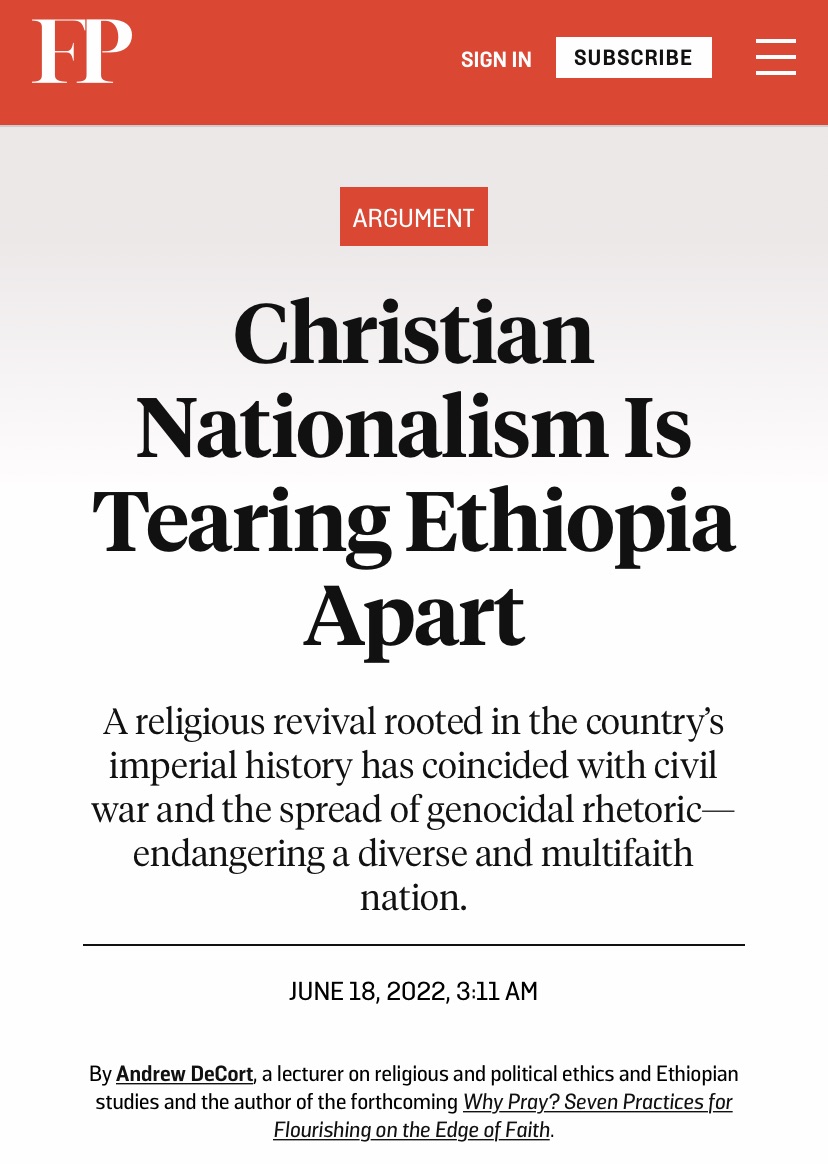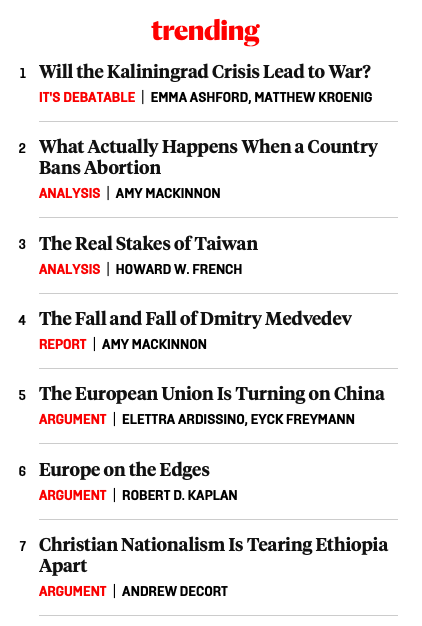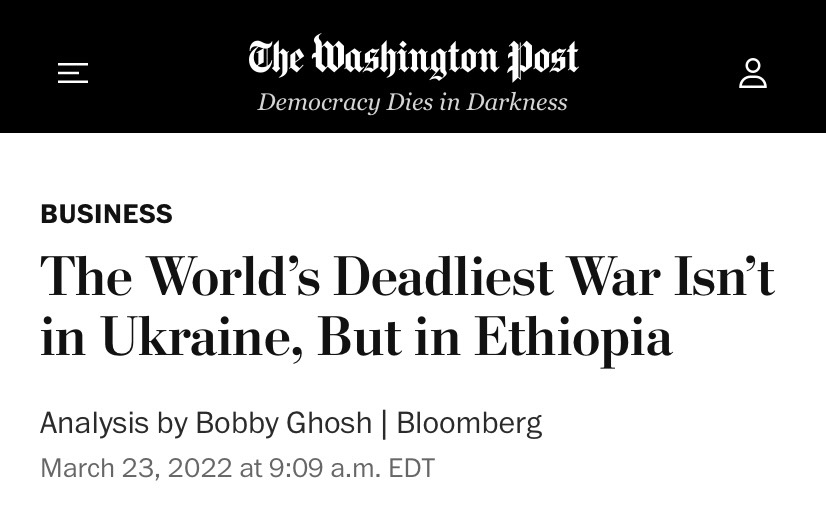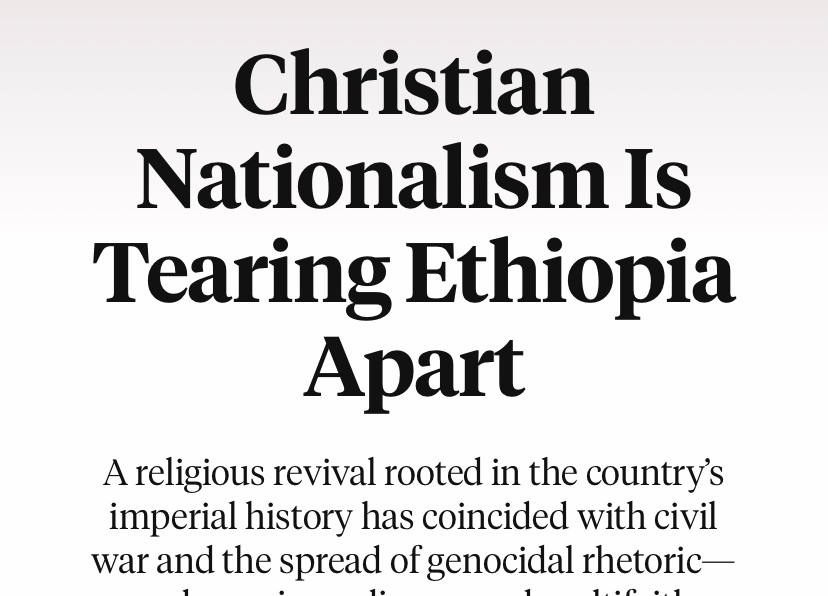Dear friends,
On June 18th, Foreign Policy published my article “Christian Nationalism Is Tearing Ethiopia Apart.” Publishing this article brought a collision of gratitude and grief in my life.

On the one hand, I was deeply grateful, because I believe this article compellingly addresses an urgently important but untouchable problem in Ethiopian society: Christian nationalism. I have been inspired by Dr. Martin Luther King’s words, “Our lives begin to end the day we become silent about things that matter.” And so I chose to break the silence.
Foreign Policy is one of the largest and most respected platforms in the world. Publishing with FP gave my article the best possible chance of being read widely and taken seriously. FP generously published it on the top of their front page, and a week later, my article was still trending on FP’s top seven list. The article has been shared thousands of times on social media and is generating lots of conversation.

I have received many encouraging messages from top Ethiopian professors, public intellectuals, theologians, religious leaders, journalists, activists, and everyday citizens. Many have told me that my article gave a global voice to the voiceless in Ethiopia. Some of Ethiopia’s emerging academic and religious leaders called the article “riveting,” “an essential and critical read,” and “a great work on a subject that most people are afraid to highlight for fear of retribution.”
Four responses from Ethiopian leaders I admire were especially moving to me:
“This article will go down in history as one of the most important documents to appear as a moral call in the dizzying vanity of senseless hatred. DeCort’s reflection is important and beautiful.” A Christian religious leader
“This was probably one of the best articles I’ve read on Ethiopia. I appreciated the rigor and honesty. Amidst so much hatred and negativity in Ethiopia and mob-style attacks on anyone who holds a different view, I just want to extend my solidarity and encourage you to continue doing the work you’re doing. Your voice is refreshing and truly needed.” A Muslim public intellectual
“Dear brother, thank you for your excellent, compassionate, and courageous article in FP. Kindness to you.” An Ethiopian historian
“I have followed your staunch commitment to truth and justice in Ethiopia through your writings. I am not a Christian, but I often mention you as a true example of Christian universalism, patience, and sacrifice when I talk about Ethiopian issues with friends and family.” A nonreligious public intellectual
These messages filled me with gratitude for the opportunity to break the silence around Christian nationalism and to call for authentic, independent, inclusive faith. Here is the conclusion to my article:
“Of course, [building an inclusive and reconciling Ethiopia] requires great moral courage. It demands denouncing all forms of religious domination, divesting insider privilege and power, and disavowing allegiance to [Prime Minister] Abiy and other rulers who build their thrones on religious arrogance, othering, and violence. At heart, it requires a deep compassion for the grief of all who suffer. Ethiopia’s diverse sacred traditions can agree on this healing moral vision, and it can show us the way toward peace: The other is not our enemy but our neighbor. There is no time to waste.”
But on the other hand, I also experienced acute grief as I published this article. Its focus is something that breaks my heart: the devastating civil war in Ethiopia and the role of Christian nationalism in fueling conflict and silencing calls for peace – both now and throughout Ethiopia’s ancient history. In this war, tens – perhaps hundreds – of thousands of people have been killed. A million people are in famine, which means they’re in danger of starving to death. And over five million Ethiopians have lost their homes.
At heart, Christian nationalism is the belief that “our” people are uniquely chosen by God, that our leader is divinely justified, and that “we” are destined for power. Christian nationalism supercharges competitive identities and relationships. It silences criticism and accountability. And it can only result in more resentment, conflict, violence, and death.

Sadly, that is exactly what we see in Ethiopia today. Of course, Christian nationalism is not the only cause for this horrifying violence; I didn’t claim that, and I don’t believe that. But it is one of the crucial, truly core causes – and one that is shielded from criticism by fear of retribution from powerful religious elites and their zealous followers.
After my article was published, I’ve received a tidal wave of online hate messages, character assassinations, and bitter denunciations. I won’t repeat the countless insults and accusations hurled against me. One of my friends made me erupt with welcome laughter when he wrote to me, “Your peer reviewers are, let’s say, vociferous.”
These responses offered real-time data on the radioactive enmity at the heart of Christian nationalism and how it weaponizes language, shuts down dialogue, and fuels conflict in Ethiopia, America, Russia, and elsewhere. It was a bitter, if ironic, confirmation of the relevance of my article.
Bittersweetly, I haven’t yet read a response to my article that actually deals with its core argument and evidence. A senior Ethiopian professor wrote to me today, “Your critics have no substantive criticisms. They understand your argument, but they just don’t want to accept it. Much of it is innuendo to silence you.”
I will not be silent. As I speak out against idolatry and injustice, I’m learning afresh to inhabit the tension of grief and gratitude as a human being who strives to follow Jesus. This article has led to a new experience of Jesus’s paradoxical blessing:
“You’re blessed when people insult you, persecute you, and falsely say all kinds of evil against you because of me. Rejoice and be glad, because great is your reward in heaven, for in the same way they persecuted the prophets who were before you.” (Matthew 5:11-12).
How remarkable: Jesus says to rejoice and be glad when we pay the price for living in the truth. Heaven welcomes this costly commitment!
I hope you’ll take a few moments to read my article and pray for a renewal of authentic, politically independent, inclusive faith in Ethiopia, America, Russia, and around the world. True faith renounces power and recentralizes Jesus’s command to take up our crosses and love our enemies.
Ultimately, Christian nationalism is a dangerous heresy that denies the core of biblical faith: every person and people group has equally precious value as our neighbors and God’s image-bearers. The promise of heaven is better than anything Christian nationalism can imagine: every language, tribe, nation, and people will join together in the song of salvation (Revelation 7:19).
If you’d like to read my article but are unable access it, please email me. If you’d like to read more, here are a few reflections:
- My response to my initial critics – it was impossible to keep up with all of them; God bless them!
- My response to gaslighting claims – people love to say you’re inciting violence when you openly condemn violence. Don’t be disoriented by the gaslight!
- My response to the claim that I write about Ethiopia to get rich – the truth is the opposite and fills me with gratitude. I have been profoundly enriched by the people of Ethiopia but not in financial terms.
On that note, I want to conclude by expressing my deep thanks to each of you who financially partners in our work, who prays for us, and who encourages us with your friendship. You keep me going and fill me with resilience, courage, and joy.
Yours with grief and gratitude,
Andrew
P.S. If you’re reading this and you’re thinking about sending me an angry message, you’re welcome to do that. But please consider praying for me instead. I need God’s wisdom and courage as I seek to tell the truth and promote peace. Your prayer might be more effective than an angry message. But feel free to write too! I welcome critical feedback. Kindly remember that critique is different from insult and character assassination. Blessings to all!




